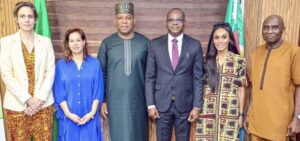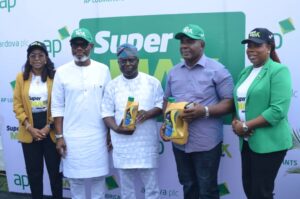LAPO Microfinance Bank partners with IITA, Water.org, IFC, others to strengthen ESG

LAPO Microfinance Bank
As climate change and poverty continue to challenge global resilience, LAPO Microfinance Bank is emerging as a leader in integrating financial inclusion with environmental responsibility.
A statement on Wednesday said through strategic partnerships with global and local organizations, including the International Institute of Tropical Agriculture (IITA), Water.org, and the International Finance Corporation (IFC), LAPO is making significant strides in its sustainability efforts, demonstrating that responsible banking is about more than just access to credit—it’s about protecting the planet and uplifting communities.
The Bank’s sustainability journey began with a $12 million credit line from the African Development Bank between 2014 and 2015. This funding allowed LAPO Microfinance Bank to introduce solar lighting solutions to off-grid, low-income households across Nigeria, providing a lifeline to many female-headed rural households while simultaneously promoting financial inclusion and reducing fossil fuel reliance. LAPO Microfinance Bank’s collaboration with the IFC from 2015 to 2021 furthered this progress.
Beyond a ₦2 billion capital infusion, the Bank received advisory support on ESG-aligned governance, helping to establish a digital roadmap to reach more clients. During this period, the bank mainstreamed its Environmental and Social Management System (ESMS), applying the IFC’s exclusion checklist for E&S risk evaluation to over six million customers by embedding climate risk mitigation platforms into its core banking solutions to further de-risk its credit portfolio.
In 2024, the Bank strengthened its commitment to sustainability with a Memorandum of understanding (MoU) signed with IITA to plant 3,500 trees in Ogun and Oyo States. The initiative features 34 species with medicinal and economic value, with 1,500 trees already thriving in Ado-Awaye and another 1,000 trees in Pade in Oyo State.
Alongside the planting, LAPO MfB distributed agricultural toolkits for vegetation propagation to clients in various communities and seamlessly trained 20 women on organic manure composition and vegetation propagation, marking a significant milestone in its afforestation project. Water.org’s $200,000 grant, announced in January 2025, marks another milestone in LAPO’s sustainability efforts.
The funding is enabling the Bank to expand its Water, Sanitation, and Hygiene (WASH) programme beyond its initial operations in Kano and Jigawa States, with a national rollout planned across Nigeria’s six geopolitical zones. This initiative will provide clean water, sanitation facilities, and promote behavior change, embedding health and dignity into daily life.
In August 2025, LAPO will launch a new recycling initiative, setting up 15 waste recovery hubs—five in Edo State and ten in Lagos. This project aims to promote circular economy practices, create jobs, and further cement the Bank’s commitment to sustainable development.
The bank’s impact also extends to education, health, and female empowerment. Since 2008, its scholarship programme has disbursed ₦612.7 million to more than 4,000 young Nigerians, and in 2024 alone, 185 students received ₦65 million in grants. In health, over 48,000 clients were trained in 2024 on topics ranging from reproductive health to youth development and social awareness.
The Bank’s gender empowerment initiatives are equally robust. In the first half of 2025, LAPO Microfinance Bank onboarded over 84,000 female clients and provided literacy and financial education to 2,000 women and young people across communities like Ado-Awaye and Ikorodu.
Through its strategic partnership with SHEALS wellness initiative, the bank gave 15 women ₦1 million in grants to grow their small businesses, while collaborations with organizations like Manners & Conduct are fostering the next generation of transformation leaders. The Bank also partnered with the TARFS Foundation and Oregun High School to distribute 534 sanitary towels and with Bright Achievers School (BAS), a free-slum school in Lagos, to provide menstrual hygiene kits to underserved schoolgirls.
LAPO Microfinance Bank’s approach is carefully crafted to align with the Nigerian Sustainable Banking Principles and international frameworks like the International Financial Reporting Standard (IFRS). The Bank’s operations directly support several of the United Nations’ Sustainable Development Goals (SDGs), including SDG 1 (poverty reduction), SDG 5 (gender equality), SDG 6 (clean water and sanitation), SDG 7 (affordable and clean energy), SDG 9 (industry and innovation), and SDG 13 (climate action).
By the end of 2024, the microfinance bank had disbursed over ₦1 trillion in micro-loans, largely to women and youth entrepreneurs, marking a significant milestone in inclusive development. This impact is a testament to the Bank’s model, which shows that microfinance, when combined with social responsibility and environmental foresight, can deliver far-reaching outcomes.
What distinguishes LAPO MfB is not only the scale of its operations but the intentionality behind them. From rural tree planting to solar-powered asset financing, menstrual health campaigns to digital credit solutions, every part of the Bank’s work aligns with a larger vision—one that places people and the planet at the core of finance.
As Nigeria faces the dual challenges of inequality and climate change, the financial institution is offering more than just financial services. It’s offering a sustainable future. By investing in green energy, clean water, empowered women, and educated youth, the bank is investing where it truly matters—securing the possibilities of tomorrow.
In the area of renewable energy, the bank that improves lives partnered with D.LIGHT SOLAR, SUNKING SOLAR, SALPHA SOLAR, LEMI SOLAR, LUMOS SOLAR, STARTIMES SOLAR, BLUETTI SOLAR, BAOBAB SOLAR, ATMOSFAIR COOK STOVE, BURN STOVE, OANDO GAS, TECH UPLOAD (OVI PILOT), and SO-LIGHT (TDS SOLAR).
The total 734,974 loan disbursement amounts to ₦18,533,952,323. As part of its primary objectives of improving lives, the bank facilitates the Easy Home project with Lafarge, with a disbursement amount of ₦21,294,467,638 since its inception; My Own Home with CBN amounting to ₦1,467,402,790; and the Better Home project (LAPO) with ₦9,645,697,489.
This continued commitment to sustainability and empowerment makes LAPO Microfinance Bank a key player in driving positive change across Nigeria.




